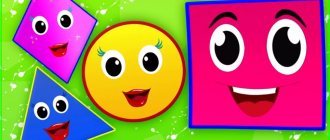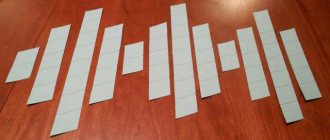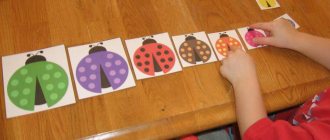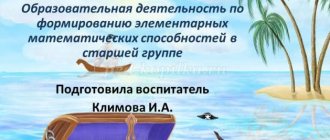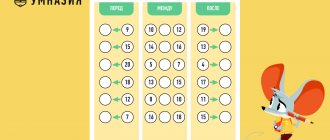Math project » Let's play! Let's find out! We’re thinking!” for older children.
“Let's play! Let's find out! We’re thinking!”
Project: long-term, group, mathematical.
Project participants: children, parents, teachers, speech therapist.
Project developer:
teacher - Petrova Natalya Vasilievna
2018-2019 academic year G.
“Without play there is no, and cannot be, full mental development. The game is a huge bright window,
Through which into the spiritual world of the child,
A life-giving stream of ideas and concepts pours out.
Play is the spark that ignites the flame of inquisitiveness and curiosity.”
V. A. Sukhomlinsky
Relevance:
Kindergarten performs an important function in preparing children for school. The success of his further education largely depends on how well and timely a child is prepared for school.
Mathematical development plays a huge role in mental education and in the development of a child’s intelligence.
Mathematics has a unique developmental effect. Its study contributes to the development of memory, speech, imagination, emotions; forms perseverance, patience, and creative potential of the individual. Mathematics is one of the most difficult academic subjects. The potential of a preschool teacher lies not in the transfer of certain mathematical knowledge and skills, but in introducing children to material that gives food to the imagination, affecting not only the purely intellectual, but also the emotional sphere of the child.
Teaching mathematics is unthinkable without the use of games (mathematical, didactic, physical education minutes). Their use helps well in the perception of the material and therefore the child takes an active part in the cognitive process.
A mathematical game requires perseverance, a serious attitude, and the use of the thinking process. Play is a natural way for a child to develop. They are interesting for children and emotionally captivate them. And the process of solving, searching for an answer, based on interest in the problem, is impossible without the active work of thought. This situation explains the importance of entertaining tasks in the mental and comprehensive development of children’s speech. During games and exercises with entertaining mathematical material, children master the ability to search for solutions independently, but children also develop speech, memory and thinking.
Objective of the project:
Development of children's intellectual and creative abilities through their mastery of logical and mathematical concepts.
Training objectives of the project:
-Teach to obtain information about a new object in the process of researching it.
-Learn to act in the process of work in accordance with the proposed algorithm.
-To consolidate the ability to observe and obey the rules in didactic games.
Developmental objectives of the project:
-Promote the formation of thought processes, speech development, and the ability to argue one’s statements.
-To form parents’ interest in the achievements of their children in joint activities with them.
-Promote the development of mental operations (analysis, synthesis, comparison, classification, logical thinking).
Educational objectives of the project:
-To foster independence, the ability to understand a learning task and complete it independently, to involve peers in extensive games.
Expected Result:
Interest in mathematical games developed among the group's pupils; the desire to play them, and on the basis of this: the formation of elementary mathematical concepts;
Activating the cognitive interest of preschool children;
Development of attention, memory, speech, imagination, logical thinking;
Ability to solve logical problems.
Activating parents' interest in the use of mathematical games and exercises.
Stage 1 - preparatory (September).
1. Selection of methodological, fiction, illustrative material on this topic.
2. Creation of a developmental environment in the group.
3. Informing project participants of the importance of this problem.
4. Selection of material for productive activities.
5. Drawing up long-term planning of various types of activities for FEMP.
6. Development of GCD notes, quizzes, entertainment.
Stage 11 - basic, practical (October - April).
PERSPECTIVE
PLAN
| Month | Direction of work |
| OCTOBER | Compiling and using a card index of mathematical games for children of senior preschool age. Game situations: “The gnome is building a house” p.3, “Ivan and the Beast” p.5 (“Mathematics is interesting.” Workbook. 5-6 years old). |
| NOVEMBER | Subgroup and individual work on the development of mathematical concepts with the help of entertaining material - a game to recreate Tangram silhouettes, labyrinths. Game situations: “Pinocchio” p.6, “The Road to the Emerald City” p.8 (“Mathematics is interesting.” Workbook. 5-6 years). |
| DECEMBER | Subgroup and individual work on the development of mathematical concepts with the help of entertaining material - puzzles “Mongolian Game”, “Columbus Egg”. Game situations: “Cat and Mice” p.10, “Ole-Lukoje” p.13 (“Mathematics is interesting.” Workbook. 5-6 years old). |
| JANUARY | Carrying out GCD using entertaining game material - games using counting sticks. Game situations: “Caterpillar” p.16, “Sleeping Beauty” p.19 (“Mathematics is interesting.” Workbook. 5-6 years old). |
| FEBRUARY | The use of riddles, joke problems, entertaining questions in educational activities and in the joint activities of the teacher and children. Subgroup and individual work on the development of mathematical concepts using the subject-game system “Honeycombs Kaye”. Game situations: “Ludvichka’s Journey to the Gingerbread King” p.22, “Cinderella” p.28 (“Mathematics is interesting.” Workbook. 5-6 years old). |
| MARCH | Subgroup and individual work on the development of mathematical concepts using an educational and gaming aid - a mathematical tablet. Game situations: “Alice in Wonderland” p.31, “Winnie the Pooh and his friends” p.35 (“Mathematics is interesting.” Workbook. 5-6 years old). |
| APRIL | Using didactic games with mathematical content in joint activities with children. Mathematical entertainment for children “Journey to Wonderland.” Conducting classes using individual counting material. |
III
– final (May).
- Using diagnostics, identify the level of elementary mathematical concepts in children of the older group.
- Creating a presentation based on the results of the project.
Conclusions:
- The project offers a system of working with children, teachers and parents to introduce educational games with mathematical content into the educational process in order to develop elements of logical thinking and creative abilities in children of senior preschool age.
- The formation of mathematical concepts and elements of logical thinking requires constant, systematic and systematic work, both in joint activities of an adult and a child, and in independent activities. Educational games with a mathematical focus contribute to successful learning of the basics of mathematics, the formation of mathematical thinking, stimulate the development of creative imagination, and the development of perseverance, will, perseverance, and determination. The works of famous representatives of preschool pedagogy and the use of modern scientific literature helped to implement this project.
- The project provides an opportunity to demonstrate in practice your professional knowledge, imagination, and creativity.
Interaction with parents:
-Recommendations for parents: “Math is an entertaining game”, “Fun math at home”»,
"Fun math at home."
-Introducing parents to different types of entertaining mathematical games and exercises.
— Conversation for parents: “How to organize children’s games at home using entertaining mathematical material.”
— Parents’ production of mathematical games and aids.
— Individual conversations.
Literature on the topic:
1. Cheplashkina I. N. “Mathematics is interesting” workbook for children 5-6 years old.
2. Mikhailova Z.A. Polyakova M. N. Cheplashkina I. N. “Mathematics is interesting” Partial program.
3. Mikhailova Z.A. "Game tasks for preschoolers"
4. A. Levin “Developing perception and imagination.”
5. N.V. Stepanova. "Didactic games in mathematics."
